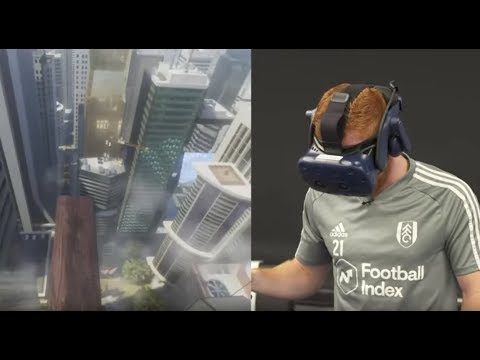There were problems with motion sickness and the lag between a player’s action and the feedback to the headset (called “latency” in the jargon). By the time Valve launched Half-Life: Alyx in 2020, the developers had solved some of these problems. Headsets became cheaper, and the range of games increased. Google has introduced a range of cardboard headsets, bringing the price down to an affordable level for everyone. As people interact with a virtual world, their reactions are often funny to watch. The reason why we find watching VR gamers so amusing is easy to find. Players are immersed in a situation that we might be able to see on a monitor, knowing what is coming and that the game is completely fake. For the player, the VR world is real—even though they know deep down it’s just a game. Here are our top ten funniest moments in VR gaming.
10 A Screamin’ Good Time
In this video, the player repeatedly tells himself that he doesn’t like what is happening to him. Judging by his reactions, this is undoubtedly true, but it begs the question of why he doesn’t take the headset off. We’ll see other videos that make us ask the same question. I suppose the answer must be that he wants to see what happens next and is afraid of looking weak if he gives up. Notice that the man does a fair amount of screaming. What good does he think that will do? Screaming is not rational, so why do we do it when we are scared? The amygdala is a structure in the brain’s center that processes those emotions triggered by fear. A scream in the amygdala prompts our brain to be more alert and heightens our powers of analysis. This may help you escape a haunted house, but a fat lot of good it will do you if you jump out of a plane and your parachute doesn’t open. Still, it’s funny to watch people reacting primitively.
9 Down the Rabbit Hole
You have to admire Mom’s persistence in this clip. She’s willing to give VR a go, even though she’s scared half to death. Her family finds her antics hilarious because they know she is safe at home and not where she believes. Of course, Mom would know this, too, if she could think about the situation rationally. But the thing about virtual reality is that it affects the brain on a more primitive level. In Lewis Carroll’s enduring classic novel Alice’s Adventures in Wonderland, Alice follows the White Rabbit into his burrow and finds herself in a nonsensical, surreal world. Her experience doesn’t help her much in a place where her logical rules often don’t apply. Very similar to the experience of donning a VR headset. Mom has gone down the rabbit hole, and, at one level, her brain is convinced that this is a true experience.
8 This Game Has Teeth
The girl here is a little wary about what her boyfriend tries to persuade her to do. He’s honest enough to admit that he hasn’t played the game before, so he doesn’t quite know what to expect. The girl has experience with VR gaming, so she is aware that this undersea world is artificial. Still, on occasions, primitive emotions come to the surface. This game is distinguished by the fact that the player has no control over what happens to her. She is in a protective cage and is warned that something is coming. As many of our players do, she says she doesn’t like what is happening. Still, there’s not much she can do about it if she wants to finish the game. An interesting advantage of VR gaming is that it can help people to get over phobias. If people can have fun with sharks, they may be helped to overcome their fear.
7 Stepping Off into the Deep End
This one is interesting because it’s a challenge shared by people you know who would probably be too ready to make fun of failure. As you will see, the premise of this game is simple. Players have to walk a short plank suspended high over a city. If they get to the end, they can step off the end and fall to the ground. The graphics clearly show an imaginary place; there’s no attempt to fool the players into thinking this is real. Our brains are divided into the reptilian (or primal), the limbic, and the neocortex (although some use different terms). When our players are walking the plank, the reptilian section is dominant. This is the most primitive of the three parts and controls vital functions such as balance, breathing, heart rate, and temperature. Rationality is not part of its function; it is concerned with basic survival. The dominance of the reptilian brain explains players’ reactions in all of our videos and explains why we, who are using more rational parts of the brain, find VR games hilarious to watch.
6 Releasing Steam
Although the player reassures himself that he is safe inside a room, rationality flies out of the window once he has his VR helmet on. He babbles occasionally and swears a lot. There’s a lot of swearing in some of our videos, and most of it is stronger than the occasional “dammit.” Swearing is a safety release that allows us to relieve tension, and the stronger the swear word is, the more effective the action is. This player is always clear in his mind that his experience is completely artificial, taking his helmet off to give himself a break before plunging back in. A good idea if you are beginning to feel overwhelmed by the experience. But our player can’t resist diving back in. The VR world is challenging, fun, and addictive.
5 Safety First
Here, we see a mixture of experiences of people who are not used to VR gaming. We have seen them in other videos. The players shut their eyes, scream, and contort their bodies while onlookers laughingly remind them that they are safe. What is particularly striking about this video is the number of times that people blunder into objects in the real world. This can be dangerous, especially for inexperienced users immersed in a virtual world with no spatial relationship with the actual. I suppose the lesson is that you shouldn’t use VR technology unless you are in a safe environment. This is one reason why some gamers prefer to play in arcades. There they are monitored and can immediately share their experiences with others.
4 This Game is Sick
This compilation backs up what we’ve said about other videos. At one point, one of the players says, “I get dizzy,” and this can be a problem with VR technology. Many players report feeling dizziness or nausea when using VR helmets. Basically, this is the difference between what the eyes are telling the player and what the body is actually doing in real space. For example, if a player is climbing stairs in a game, but the body knows that it is really on a flat floor, the player can get disoriented. This feeling can be heightened by something under the impressive name of “vergence-accommodation conflict.” This occurs when, in VR, the eyes are focused on something that seems to be far away but which, in reality, is on a screen right in front of the eyes. But watching people whirl and stagger as if they’ve over-indulged at the Christmas party can be comical.
3 Don’t VR Alone
This video highlights the fact that people shouldn’t use VR alone. You might find—in fact, you probably will—that everyone else in the room is laughing themselves sick. Not funny to you when you are going through a terrifying experience. Never mind, you will have your turn to laugh at the others, and it’s better to be safe than sorry. I wonder if it might be a good idea to incorporate a proximity sensor into VR headsets so that people get a warning if they are too close to a real object.
2 With Metaverse, It’s Only Going to Get Better
The commentator on this video points out that space is important. He’s talking about having enough room to play safely. It’s a point we’ve already made, and it’s certainly true. However, in VR, two different spaces collide—the real world and the imaginary. The fact that the Facebook group has changed its name to Meta tells us something about the unlimited ambition that drives the company. It is now dedicated to building a Metaverse. The idea behind a metaverse seems to be the construction of an alternative reality that is internally logical but allows users to perform actions in the “real” world. Gaming will undoubtedly be an important feature of the Metaverse, and companies are developing new technologies to make the experience more real. More real and more fun for everyone.
1 Fast Food Futures
I don’t know if “funny” is the right word to describe this last clip. “Surreal” might be better. The normal activity of ordering a meal in McDonald’s becomes an interactive shooter game with graphics from an early Duke Nukem. The only limits in VR are the limits that we place on our own imaginations. The gaming world is changing, and the changes aren’t just limited to gaming. VR can change the way that we interact with the world. How we live, work, play, and relate to others might change dramatically.
























